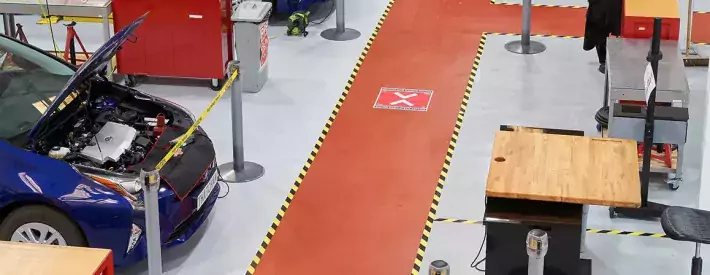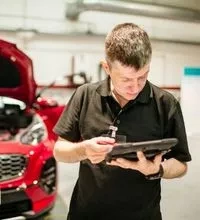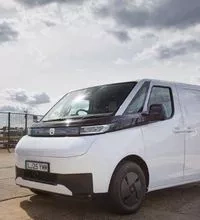Thatcham explains: How to work safely in a bodyshop

In this article: With more vehicles on the road, there’s going to be an upswing in vehicle repairs, especially at bodyshops. Here’s how to stay safe at work as business begins to pick up.
As the COVID crisis continues, automotive repairers are rapidly adapting to the challenges posed by ‘the new normal’. In many cases, it’s a question of employing common sense precautions, but it helps to set these down into a clear and concise company policy, so staff and customers are all aware of what they should do.
To find out more MotorPro spoke to Dean Lander, head of repair sector services at Thatcham Research. The organisation has recently resumed on-site training for apprentices at its Berkshire-based Automotive Academy, following the introduction of a number of COVID-safe measures to maintain social distancing. Here are his recommendations.
The two-metre rule
Government guidance states that employees should “stay two metres apart from other employees and customers (or one metre with risk mitigation where two metres is not viable)”. Thatcham has designed its processes to maintain the full two-metre separation wherever possible, but Lander acknowledges that it’s not always feasible. “Sometimes larger components such as bumpers or bonnets require a two-person lifting process when they’re being fitted or removed. In those circumstances, we ensure that appropriate PPE equipment is worn, such as face coverings and visors,” he says. “We also try to minimise the amount of time that individuals stay in close proximity with one another.”
Workshop layout
It’s best to avoid situations where two technicians may be directly facing one another, as this significantly increases the risk of virus transmission. It’s also worth considering the positioning of the vehicles.
“The allocated bays that you have in most workshops already provide a degree of social distancing, but there are some simple things you can do to make the most of that space,” says Lander. “For instance, if you have two cars next to each other that both have front end damage you could reverse one into the workshop and drive the other in forwards so the technicians are working at opposing ends of the bays.”
Maintaining cleanliness
While much of the public debate has focused on face coverings, the government’s official guidelines stress that social distancing, hand hygiene and surface cleaning are the most effective means of preventing the spread of the virus. Cleaning, in particular, is an important step for garage environments where customer cars are regularly coming and going.
“Disinfecting customer cars is one of the biggest challenges for the industry as a whole now,” says Lander. “Whether you’re a dealership, a bodyshop or a repair centre you need to ensure that there are appropriate cleaning protocols in place to cover the car handover, which includes disinfecting the major touch surfaces.”
A wide range of different cleaning products and treatments are available. Antibacterial cleaners based on isopropyl alcohol are generally a safe and effective solution, but you should always read the label to ensure that they will be compatible with all materials in the car’s interior. If in doubt, contact your supplier to check.
Dealing with customers
Most garages already have a visitor policy, and it’s vital that these incorporate COVID safety measures.
“Generally, the first step is to reduce the number of people who are coming onto the premises,” says Lander. “Where possible, you should have a one-way system, along with social distancing protocols and appropriate cleaning measures. For instance, in our reception areas we have marked out waiting areas that are socially distanced, and we have introduced a contactless check-in process that prevents the need for the visitor to come into close contact with the reception staff.”
Cleaning is important here too, particularly for objects that are touched regularly, such as door handles or card machines. Perspex screens in front of the counter and a drop box for depositing keys are also useful, plus MOT centres are allowed to close their viewing areas. It’s also suggested that business should stagger arrival and departure times for staff, visitors and guests.
For the latest information, advice and support please visit the IMI’s dedicated COVID-19 pages.




